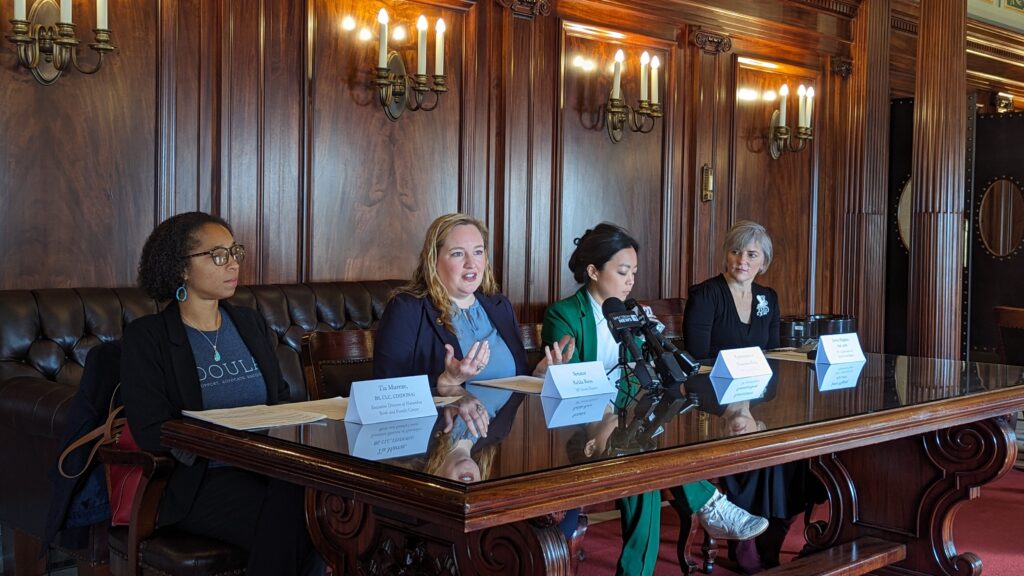Legislative Democrats Propose Legalizing Abortion, Requiring All-Options Counseling
Proposal would repeal restrictions in place before Roe vs. Wade was overturned.

Sen. Kelda Roys (D-Madison) and Rep. Francesca Hong (D-Madison) introduced a package of bill meant to restore patients’ right to privacy and medical care on Wednesday. Photo by Baylor Spears/Wisconsin Examiner.
Democratic lawmakers and reproductive rights advocates are looking past eliminating an 1849 Wisconsin law, which until recently had effectively ended all abortion services in the state, to repealing most state statutes restricting abortion.
At a press conference on Wednesday, Sen. Kelda Roys (D-Madison) and Rep. Francesca Hong (D-Madison) said the “Reproductive Freedom Act” would restore patients’ right to privacy and medical care.
The package of bills would eliminate existing abortion restrictions, require pregnancy counseling facilities that receive public money to provide all-options counseling and create an obligation for health care providers to give medically accurate information to patients.
“Politicians should never interfere with patients’ right to receive medical care, the best medical care for that patient,” Roys said. “That includes accurate information. That includes noncoercive and nondirective counseling and that includes not putting arbitrary restrictions that are medically unnecessary or worse, harmful on access to medical care.”
Planned Parenthood recently started offering abortion services in Wisconsin again after a Dane County judge said in a ruling allowing Attorney General Josh Kaul’s lawsuit to move forward that the 1849 law applies to feticide not abortion. Since that decision, anti-abortion groups have insisted that the 1849 law applies to abortion — calling for district attorneys to enforce the law and targeting the licenses of doctors who resume providing abortions.
Kaul’s case, which asks for the 1849 criminal law to be ruled unenforceable, is expected to make it to the Wisconsin Supreme Court.
On Wednesday, Democrats proposed repealing several of the restrictions that guided Wisconsin abortion services before Roe v. Wade was overturned.
One bill would eliminate a ban on abortions after 20 weeks of pregnancy, parental consent requirements for minors seeking abortion services, a criminal penalty on someone who is not a physician performing abortions, a prohibition on coverage of abortions by qualified health plans, and a prohibition on giving people abortion-inducing drugs unless the physician who provides the drug performs a physical exam on the woman and is physically present in the room when the drug is taken.
Jenny Higgins, a professor at UW-Madison and director of Collaborative for Reproductive Equity (CORE), said the timing of the bills is important.
“When Planned Parenthood of Wisconsin began offering services again, I think among some folks, there’s the sense of like, ‘Okay, we’re all set now. People have access to care,’ Higgins said. “But Wisconsin has long been considered hostile to patients’ access to abortion and other forms of evidence-based, reproductive health care.”
“Just because services are reinstated in some areas of Wisconsin doesn’t mean that there aren’t a whole bunch of non-evidence-based practices that folks still have to go through in our state,” Higgins added.
Higgins said there is a lot of evidence that illustrates the harmful effects abortion restrictions can have on people’s lives and on their partners, families and communities. Some of the impacts of abortion restrictions noted in a brief by CORE include an increase in maternal mortality and chronic health problems, reduction in the ability to achieve educational, career and other life aspirations and immediate and long-term effects on an individual’s mental health.
Tia Murray, a doula and executive director of Harambee Birth & Family Center, said it’s essential that legislation reflects where Wisconsin is in 2023 and going forward.
“1849 was a long time ago, a lot has changed,” Murray said. “We’ve made some good steps. We’ve opened up some of the restrictions as far as access to abortion, but this is really about informed choice, which really is the heart of medical care.”
Murray noted that Wisconsin has some of the greatest disparities in maternal and child health outcomes in the country. According to the state Department of Health Services, the maternal death rate for Black women in Wisconsin was five times that of white women in 2006-2010 — far outpacing the national disparity in that period.
“If you think about someone like me, who may be pregnant right now, and I know that I’m five times more likely to die from giving birth to this baby, that gives me pause,” Murray said. “I may want options and due to the restrictions that we currently have those options may not be shared with me or they may not be made available.”
The other bills in the package seek to address these concerns by ensuring patients are entitled to accurate information about abortion and other options.
One bill would require that centers providing pregnancy counseling services cover all options available, including abortion. The bill specifically targets pregnancy resource centers, which have long been criticized by reproductive health advocates for providing misinformation and working to steer women away from abortion. There are about 70 crisis pregnancy resource centers in Wisconsin, and some currently receive state funding through Choose Life Wisconsin, a program that gets money through optional fees on license plates.
Murray said she has met people who have been to pregnancy crisis resource centers and felt like they weren’t a part of the decision making process.
“We hear things like ‘It felt very one-sided. There weren’t people that looked like me. It felt very religious-based,’” Murray said. “Some of these practices can make people feel shameful, they are degraded. That is not an environment we want to create when we’re trying to support and counsel.”
The final bill seeks to implement protections for patients and health care providers when it comes to receiving and providing medical information.
Specifically, the bill would create an obligation for health care providers to deliver medically accurate information to patients and create a right for patients to receive such information. It would also prohibit people from interfering with the rights established in the bill and prohibit retribution against employees. Patients and health care providers whose rights were inhibited would be able to file civil action under the bill.
The package is unlikely to progress far in the Republican-led Legislature, especially as the Senate recently passed two bills that are supported by the state’s leading anti-abortion groups and directly conflict with Democrats’ bills.
One Republican bill would redefine “abortion” in Wisconsin statute to say it doesn’t include a physician’s performance of a medical treatment intended to prevent the death of a pregnant woman that is not designed or intended to kill an “unborn child.” Another bill would provide about $1 million in public money in each fiscal year to Choose Life Wisconsin. It’s unclear whether the bills will advance in the Assembly, but they face a likely veto should they reach Gov. Tony Evers’ desk.
Democrats propose eliminating Wisconsin abortion restrictions, requiring all-options counseling was originally published by the Wisconsin Examiner.





















